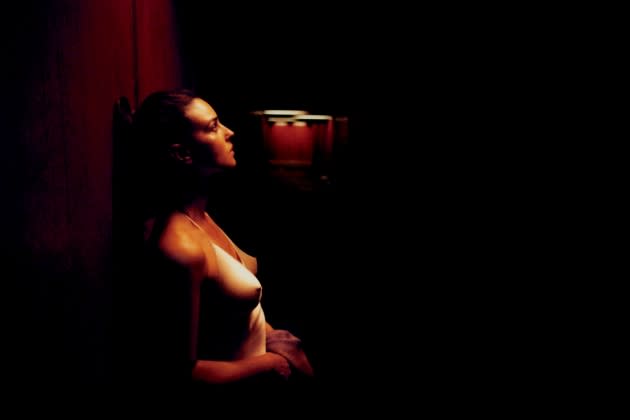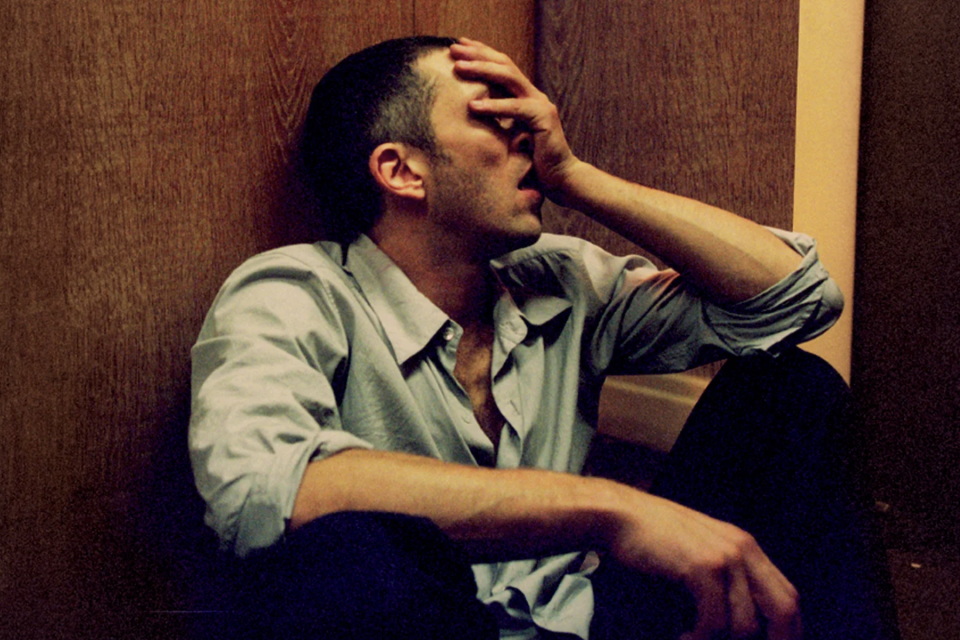One of the Most Controversial Movies Ever Is Back in Theaters
- Oops!Something went wrong.Please try again later.
- Oops!Something went wrong.Please try again later.
- Oops!Something went wrong.Please try again later.
- Oops!Something went wrong.Please try again later.
- Oops!Something went wrong.Please try again later.

Gaspar Noé’s Irréversible — the notoriously graphic, 12-scene rape-revenge tragedy from 2002 — still has the capacity, to say nothing of the will, to shock. The movie premiered at Cannes to jeers and walkouts, a long tail of outrage and a reputation that would grow to precede and overshadow the art. This was all clearly to the director’s point. The movie stars Albert Dupontel and a then-married Monica Bellucci and Vincent Cassel in a slippery trio of roles: a couple (Bellucci and Cassel) and the woman’s ex. It opens with a savage beating in a gay S&M club. The story thereafter hinges on a 9-minute-long scene of sexual assault that appears midway through, an endurance test if ever there was one, with a strident style to match: the entire attack plays out in a series of invisible cuts edited to resemble a single, unbroken take, the transfixing duration gluing us to our seats and rendering us completely helpless in the face of unimaginable horror. You don’t need to have seen the movie to know about this scene. It has by now grown completely outside of the movie that contains it.
That explains Irréversible’s infamy. It has endured as a dare and a cult object for other reasons. There is, for example, a totalizing gimmick to this story: In winking contrast to its title, the movie travels in reverse. Its twelve winding scenes are presented in backward order, which is easy enough to follow at the level of plot — revenge fantasies have a way of adhering to a basic structure of bad acts and necessary comeuppance. Only: Noé, ever willing to provoke, wields this structure to upend our expectations for neat psychological explanation. We witness the climactic revenge at the very start, quite a bit before we see what inspired it and before we really know who any of these people are. But once Irréversible’s inciting assault happens, there’s still half of a movie to watch, a chance to slip into more mundane territory, watching our central trio go to a party, make love, argue in public, and altogether insinuate themselves as more or less normal (if not always likable) people thrown into the literalized, camera-stirring whirlwind that Noé has in store for them. It’s the thing about Irréversible that’s always made it a curious experiment. In twisting the structure of basic tragedy, it wills itself into a dramatic arc that risks leaving us unsatisfied — something worth feeling, perhaps, in a rape-revenge genre that sometimes risks conflating the satisfaction of retributive bloodshed with actual justice.
More from Rolling Stone
An Urgent Ode to Worker Solidarity, Through the Eyes of a Desperate Woman
Léa Seydoux's Sexual and Spiritual Awakening in 'One Fine Morning'
Eight Women Say the Same Man Raped or Assaulted Them. Now They're Out for Justice
Still, you had to wonder how the movie might have played if its structure hadn’t been reversed — if its conclusion bent more toward the usual. We now, with Noé’s permission, have a chance to find out. A 2K restoration of Irréversible — the original cut — is currently touring the country. Headlining that tour: Irreversible: The Straight Cut, the same movie, only backward. Rather, in the right order. Technically, this chronological cut already existed, albeit in an unofficial capacity. A janky unauthorized attempt was offered on the Korean home video release of the movie as a DVD extra (which is how Noé became aware of it). The director had already been asked, from the start, to just present the movie the normal way, perhaps because the mix of unique structural gimmick with perilous subject matter felt like too much of a risk. The Straight Cut doesn’t feel like a concession so much as an opportunity to play around — it is in fact a few minutes shorter, thanks to some shaving down of transitional scenes — and the reordering has, inevitably, made it possible to see some scenes and details anew.
Before, Irréversible began with Marcus (Cassel) and Pierre (Dupontel) being led out of a sex club called the Rectum by police and emergency workers. Our introduction to Alex (Bellucci) is long-delayed, and startling when it comes: The first thing we see is her face beaten beyond recognition as she lays unconscious on a stretcher being carried out of the scene of her attack. Then we see the attack. And then we see the lives that were being lived beforehand, which are now — as we’ve seen — irrevocably changed. The original movie ended with a brief glimpse of something like Eden, the fecund greens of a park, children playing, innocence abundant. It felt acerbic, rather than reassuring, coming at the tail end of such a brutal movie. In the new cut, we start with Eden. We meet the central trio and are offered an array of scenes that make them come off as human beings. What before felt like an ironic optimism sneaking into the last act now feels like normal, boring, fitful, conflict-ridden, everyday life — like palling around with half-interesting people. Then the shocks come. And they keep coming.
It’s an interesting experiment, if not a fair fight. What makes the original Irréversible more interesting than it has any right to be are the details — the actions — that seem to tell us who these people are, even if they’re only arriving before us in a moment of extreme pain and anger. We watch Cassel’s Marcus rage and rage as he hunts down Alex’s assailant. We get a succession of dizzying scenes abetted by Noe’s artfully unstable camera, which seems to be spinning on multiple axes, a show-off encapsulation of delirium that works because of the textures and violence being captured. The opening segments of Irréversible are as awe-struck as the final moments of Taxi Driver, with its godlike hovering over the scene of a massacre (a moment that Irréversible evokes, perhaps intentionally.) We’re encouraged to notice the way that the camera stills as we proceed backward — that it’s motivated by a mental state. Simple concept, to be sure, but the unlikely thing about Irréversible has always been that it’s seemingly simple-minded, brash, immature tricks dredged up just enough of the right kind of distortion to make us think a little. What’s with this guy Pierre who, in the moment that he’s bludgeoning a man’s face, stops to look around at the gathering crowd of poppered-up pain pigs in Rectum like a man pausing to flex? What explains the enforced confidence he has, like that of a matador? Part of the pleasure of the movie is our gradual ascent into awareness — our eventual knowledge that Pierre, being a man of intellect, understands himself to be absent of such unbridled rage (or feeling generally: this, Alex informs him, is why he was never able to make her come.)

Its winding arc of the psychological details that the reverse order gave us is what the Straight Cut diminishes, on purpose. You can see why the director might value this straight take on the story. Noé has said that the original Irréversible attaches us so unmistakably to Marcus that the Alex who later emerges, after being attacked, comes off somewhat more abstractly. She doesn’t get to be a person, or even say a single line, before we see what has been done to her body. Marcus’s anger, injury and rage lead the movie, rendering him into the initial protagonist of the affair, even as our first impression of the man is of a coked-up lunatic prone to despairingly violent acts. The Marcus that emerges when the story is told chronologically, by contrast, comes off impishly at first — hard to attach ourselves to. And the violence that later arrives has been given a clear motive. It is psychologically-tethered: we come to expect it.
Irreversible: Straight Cut is worth seeing if you’ve already got an opinion about the original (and, importantly, if you can stomach it). It isn’t where anyone should start, if they should start at all. This is a reckless, brutish movie either way — but watching the new cut makes you miss out on the strangeness of watching characters who don’t know what you know: how awfully, irredeemably this story ends. It has nothing to compare to the original’s oddly diffuse latter half, improvisatory nothingness of characters who do not know that they are functions of an idea, beholden to a concept yet somehow more realistic for it. What has survived unchanged in Irreversible: Straight Cut is its unbearable violence. It is still just as hard to watch. Even as a structural tumult rejiggers our approach to and relief from those scenes, shifting the order has a way of shifting the implications. And those tensions and questions wind up mattering more than we may have realized. Perhaps that is what makes the recut worth it: It certifies the worth of what we already had.
Best of Rolling Stone

